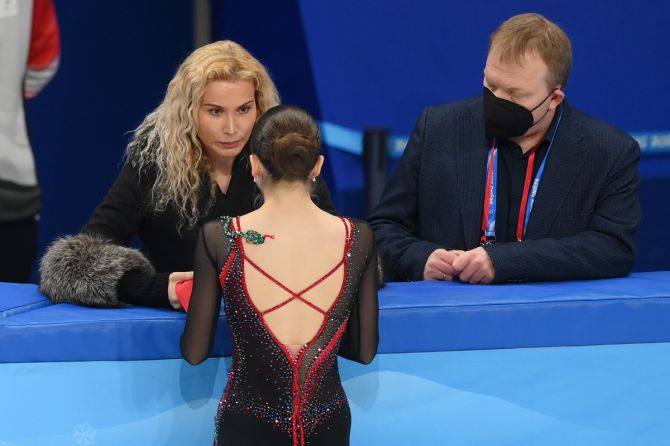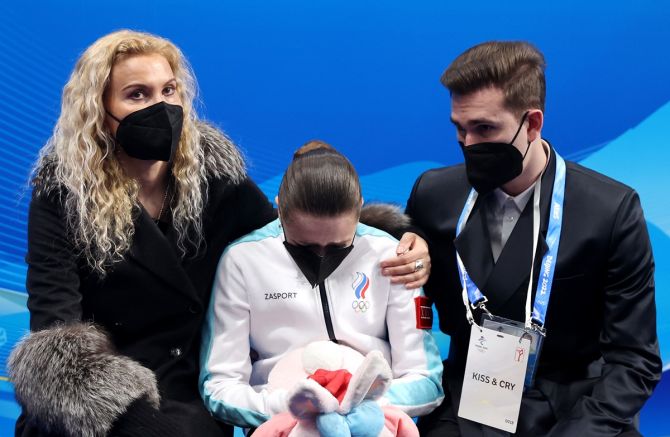 | « Back to article | Print this article |

Olympic chief Thomas Bach said on Friday it had been "chilling" to witness Russian teenage skater Kamila Valieva crumble under pressure at the Beijing Olympics as a doping scandal continued to swirl, hitting out at the 15-year-old's entourage.
The saga has opened a debate on the suitability of the Olympic environment for minors, but Bach said the International Olympic Committee had limited means of action.
Valieva, who had been leading the women's figure skating event after the short programme, cracked in her free skate on Thursday night, and stumbled down to fourth place as compatriot Anna Shcherbakova skated to gold.
"I must say I was very, very disturbed yesterday when I watched the competition on TV," Bach told a news conference.
"How high the pressure on her must have been."
Valieva failed a doping test at her national championships last December but the result was only revealed on Feb. 8, a day after Valieva had already helped the Russian Olympic Committee (ROC) win the team event.
The Russian Anti-Doping Agency lifted a provisional ban on her and the Court of Arbitration for Sport (CAS) on Monday rejected an appeal by the IOC, the International Skating Union (ISU) and the World Anti-Doping Agency (WADA) to re-instate the suspension - therefore allowing her to compete in the single event on Tuesday and Thursday.
CHILLING TO SEE

"To see her struggling on the ice, to see her, how she tries to compose herself again, how then she tries to finish her programme and you could see in every movement, in the body language, you could feel that this is immense, immense mental stress and maybe she would have preferred to just leave the ice and try to leave this story behind her," said Bach.
Valieva left the ice hiding tears behind her hands and sobbed in the 'kiss and cry' area as her coach, Eteri Tutberidze, confronted her.
"Why did you let it go? Explain it to me, why? Why did you stop fighting completely? Somewhere after the axel you let it go," Tutberidze said.
"When I afterwards saw how she was received by her close entourage... it was chilling to see this," said Bach.
"Rather than giving her comfort, rather than to try to help her you could feel this chilling atmosphere, this distance and if you were interpreting the body language of them, it got even worse because this was even some kind of dismissive gestures.
"All of this does not give me much confidence in Kamila's closest entourage."
Bach admitted that the IOC, while it was addressing the matter, could not do much to control an athlete's entourage.
"We see we have extremely limited means to address it," he said. "We are not the police, we cannot interrogate and have a formal prosecution procedure; and our sanctions are extremely limited.
"In the end, it's a question where we need the support of governments."
Court of Arbitration for Sport ignored anti-doping code in Valieva ruling, says WADA
The World Anti-Doping Agency (WADA) on Friday accused the Court of Arbitration for Sport (CAS) of ignoring the world anti-doping code when it upheld the Russian anti-doping authorities' decision to lift the provisional suspension of Russian teenage figure skater Kamila Valieva at the Beijing Olympics.
CAS ruled on Monday that Valieva should be allowed to compete in the women's competition despite having failed a drug test at her national championships last December.
The result was only revealed on February 8, a day after Valieva helped the Russian Olympic Committee win the team event at the Beijing Games.
In its reasoned decision published on Friday, CAS said it went with the Disciplinary Committee (DADC) of the Russian Anti-Doping Agency's argument that the 15-year-old Valieva, being a 'protected person', did not need to meet the usual standards to prove that she did not take the banned heart drug she tested positive for willingly.
"The Committee (DADC) considered that the Athlete established, at least at the 'reasonable possibility' level and at the maximum at the 'balance of probability' level, that the violation resulted from the ingestion of a contaminated product," CAS said.
Valieva's defence had argued that the positive test resulted from a mix-up with her grandfather's heart drug, trimetazidine.
"In the DADC’s opinion, in fact, the Athlete could have consumed a product which has been contaminated by the drugs used in her inner circle," CAS continued.
That explanation did not satisfy, WADA, who said that a 'protected person' (i.e. an Under-16 athlete) should not be treated differently as far as provisional suspensions are concerned.
"In effect, by making this award, the CAS Panel has re-written the Code to say that mandatory provisional suspensions for ‘protected persons’ shall now be considered as optional provisional suspensions," WADA said in a statement.
"This is not what the Code says, not what the Code drafters intended and was never proposed by any of WADA’s stakeholders during the three rounds of Code consultation.
"This re-writing of the Code, which would apparently allow ‘protected persons’ to continue competing after testing positive for non-specified substances without any clarification of the circumstances, risks undermining the integrity of sporting competition and the confidence of athletes that they are competing on a level playing field."
Valieva topped the women's competition standings after the short programme on Tuesday but crumbled under pressure in Thursday's free skate and slipped down to fourth.
Her 17-year-old compatriot Anna Shcherbakova won the event.
